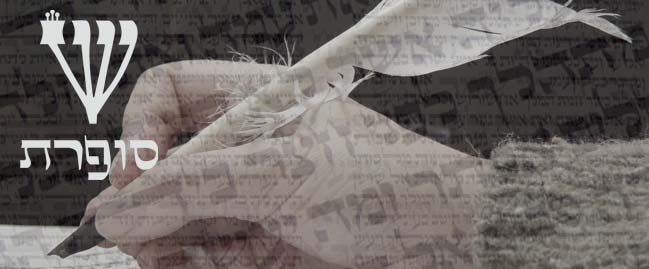PARSHAT VAYIQRA'S LITTLE ALEF
BS"D
A SMALL ALEF
Vayiqra parshat Vayiqra/Leviticus 1:1
"Vayiqra el-Moshe vay'dabeyr Y-H-V-H eylav meyohel mo'eyd leymor."
"And He called to Moshe - HaShem spoke to him from the Tent of Appointment, saying:"
"...called..." - according to an ancient regulation, the last letter of the word "Vayiqra" is in miniature. The Sacred Text was in ancient times written in a continuous row of letters, without any division between the words. When the last letter of a word was the same as the first letter of the next, as is here the case, one character would often serve for both (Luzzatoo). When at a later time both letters were written out, one of them was in smaller size to show that it did not originally occur in the Text - an illustration of the profound reverence with which the Sacred Text was guarded by the Sofrim/Scribes.
Still others search for a deeper meaning. Why is this particular letter of this particular word written so? The use of the word "call" indicates that G@D wished to speak to Moshe, and purposefully called him. G@D's prophesy to Bil'am (Bemidbar/Numbers 23:16), however, is introduced by "vayiqar", without an Alef, a word that has two connotations: chance (miq'reh) and spiritual contamination (as in I Shmu'el/Samuel 20:26). This implies that, while G@D had a reason to speak to Bil'am, he did not do so with enthusiasm. The small Alef used in this word makes it appear like the word used for Bil'am. The Ba'al HaTurim tells us that when G@D was dictating the Torah to Moshe Rabeynu/our Teacher on Mount Sinai, G@D chose the word "Vayiqra" to indicate that G@D had specifically selected Moshe Rabeynu/our Teacher to lead us and to show what an intimate relationship they possessed. Moshe Rabeynu/our Teacher, being "The Most Modest Man in All The World" as the Torah tells us (that's quite a thing to be able to boast about - I wonder how he dealt with writing that down?), was reluctant to enscribe this, preferring instead to write "Vayiqar" - which means "He happened by" - to suggest a coincidence in his relationship to G@D rather than his chosen-ness. That is why the Alef is so small, to express the humility of Moshe Rabeynu.
This smallness, ironically, actually serves to give prominence to the letter as if it were a separate word, ie: "Vayiqar Alef...". The word "Alef" means, among other things, "to teach", thus implying that no one should learn always to be "small" and humble. No one was better qualified to teach this lesson than Moshe Rabbeynu/our Teacher because he was not only the greatest of all prophets, but also the humblest person who ever lived (R' Bunam of P'schish'cha).
& in all the generations since, whether for reasons of humility or otherwise, there are always Jews who struggle with their chosen-ness as B'nai Yisra'el.
Shavu'ah tov!














0 Comments:
Post a Comment
<< Home